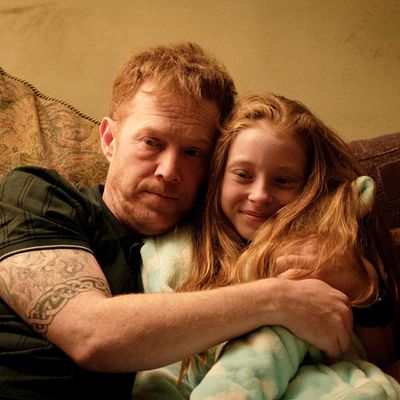
I wish I could have been a fly on the wall when Ken Loach first learned about the “gig economy.” The debilitating delusion underlying that concept — the dream of being your own boss, only to find yourself trapped on an accelerating, unstoppable hamster wheel of work — fits right in with the veteran director’s moral vision of a world in which ordinary humans regularly think they can outsmart a system designed to destroy them. Loach is perhaps Britain’s foremost cinematic chronicler of working-class angst and quotidian humanism. Strident outrage bubbles just beneath the ambling, improvisational cadences of his films. And I can only imagine that the old lefty director of Kes, Raining Stones, and The Wind That Shakes the Barley blew a gasket when he learned about how so many of today’s workers have been bilked into thinking they can be free operators in a tech-enabled landscape of merciless profit.
And so, we have the opening scene of Sorry We Missed You, in which Ricky (Kris Hitchen), a former Newcastle builder who never really recovered from the 2008 financial meltdown, explains to Maloney (Ross Brewster), the hulking manager of a postal delivery business, why he wants to give up a life in construction and landscaping to start driving for him. Ricky is tired of being beholden to others, of taking orders. “There’s always someone on your back, isn’t there?” he observes, bitterly. And he seems just like the kind of guy who would think that: confident enough to assume reality will bend to his will if he just puts in extra effort, and too proud to ask for a handout. (“Have you ever been on the dole?” Maloney asks. “I’d rather starve first,” Ricky replies.)
Maloney then proceeds to give Ricky a peculiarly Orwellian form of modern corporate sweet-talk as he explains to him how their delivery service works: “You don’t get hired here; you come onboard. We like to call it onboarding,” he says. “You don’t work for us; you work with us. You don’t drive for us; you perform services.” Within this nice little litany of bullshit, however, lie hints as to the real nature of this deal. “There’s no employment contracts,” Maloney continues. “There’s no wages, but fees. No clocking on. You become available.” In short: You work round the clock, we don’t owe you anything, and don’t you dare even think about mentioning your rights.
But hey, Ricky’s got his freedom, no? “Master of your own destiny, Ricky,” Maloney crows. “Sorts the fucking losers from the warriors.” In fact, Ricky turns out to be master of nothing. He soon learns that his life will now be run by the scanner (also called a “gun”) that he must carry everywhere, which tracks him and tells him where all these mail-order packages must be transported and when; he lives or dies by the precision and speed of his deliveries, and there’s always someone else ready to take his route if he falters. He can’t even stop to use a bathroom; early on, a colleague gives him a plastic bottle to carry around so he can piss in it while on the road.
Ricky’s got one of those jobs that economists like to call “a growth sector.” His wife, Abbie (Debbie Honeywood), has another, as a home health-care worker. Endlessly patient but increasingly exasperated, she allows Ricky to sell her car in order to buy a van and starts using public transportation to do her daily runs. Over the course of the film, we see her visit various patients (or “clients,” as they’re called — her industry has its share of pseudo-empowering blather as well) while her husband crisscrosses town making his deliveries. Abbie’s job is to check in on these people — many of them elderly, all of them vulnerable — and feed them, bathe them, tuck them in, which also means ironically that she’s not around to feed or tuck in her own kids, instead calling from the bus with instructions on how to reheat dinner and reminders to do their homework.
Well-researched and highly detailed in how it lays bare the empty promises of the gig economy and the ruthless techno-feudalism of e-commerce, Sorry We Missed You is a movie that will infuriate you. But what makes it one of Loach’s best isn’t just its rage (which is plentiful) but its compassion (which is overwhelming). The people that Ricky and Abbie come in contact with make for a touching cross section of humanity, from an elderly woman suffering from dementia, to a mentally disabled man depressed that he has nothing to do with his life, to a rabid sports fan set off by Andy’s Manchester United T-shirt. Like the classic Italian neorealists, the director gives us a vivid sense of life beyond the frame, a knowledge that these people all have their own stories. And Loach doesn’t judge any of his characters. Even the boorish, brutish Maloney is ultimately a servant of the system. Everybody’s caught inside a giant machine that discards the weak, feeds on the strong, and perpetuates itself.


